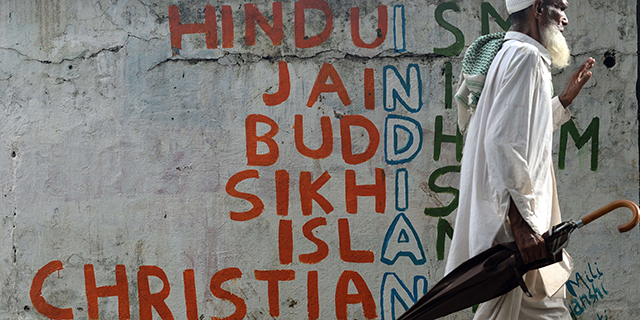
Bipartisan Federal Commission recommends India’s designation as Country of Particular Concern (CPC), urges US Congress, State Department to impose sanctions.
TCN News
The Indian American Muslim Council (IAMC – www.iamc.com), an advocacy group dedicated to safeguarding India’s pluralist and tolerant ethos has welcomed a report on religious freedom issued by the US Commission on International Religious Freedom (USCIRF), in which the US body has called on the State Department to place India in a list of “countries of particular concern,” for the second consecutive year, based on the sharp escalation in violations of human rights and religious freedom in India.
The USCIRF is an independent, bipartisan US federal government commission. It makes policy recommendations based on its review of global religious freedom to the US President, the Secretary of State and the US Congress. Last year, USCIRF had placed India in CPC, which is the list of countries with the worst record of religious freedom violations.
It is saddening to see India, a land with a rich tradition of pluralism, lifted as an egregious violator of religious freedom. However, the worsening situation of minorities in India has made it clear that international visibility and recognition of the persecution of Dalits, Christians, Muslims and Sikhs in India is the need of the hour.
“Designating India as one of the world’s worst violators of religious freedoms, while unfortunate, is expected and justified,” said Rasheed Ahmed, Executive Director, IAMC. ‘We hope the US Department of State will accept the USCIRF’s recommendations and designate India as a CPC this year.”
In its Annual International Religious Freedom Report released on Wednesday, USCIRF has made five key recommendations to the US Department of State and US Congress. It said the US should designate India as CPC “engaging in and tolerating systematic, ongoing, and egregious religious freedom violations, as defined by the International Religious Freedom Act (IRFA).”
The USCIRF report also recommended that the US Government impose “targeted sanctions on Indian government agencies and officials responsible for severe violations of religious freedom by freezing those individuals’ assets and/ or barring their entry into the United States.”
The report further said the US Government must “promote religious freedom and dignity and interfaith dialogue through bilateral and multilateral forums and agreements, such as the ministerial of the Quadrilateral” and continue to “raise religious freedom concerns in the U.S.-India bilateral relationship and highlight concerns through hearings, briefings, letters, and congressional delegations.”
It also said that the US Government must condemn the “ongoing religious freedom violations and support religious organizations and human rights groups being targeted for their advocacy of religious freedom.”
The USCIRF Report has also highlighted the massacre of Muslims in India’s capital, New Delhi, last year in which 50 people died and hundreds were injured, mostly Muslims.
“Mobs sympathetic to Hindu nationalism operated with impunity, using brutal force to single out Muslims, attack mosques, and destroy homes and businesses in majority-Muslim neighborhoods,” the report said.
Along with several US-based rights organizations, IAMC had this month written to USCIRF urging it to retain its last year’s recommendations to designate India as CPC. That letter was co-signed by leading rights organizations, including International Christian Concern (ICC), Christian Solidarity Worldwide (UK), Hindus for Human Rights (HfHR), Federation of Indian American Christian Organizations of North America (FIACONA), Justice For All, American Muslim Institution, American Sikh Council, Church of Scientology National Affairs Office and Just Law International.
Prominent individuals who signed the letter included Rev. Dr. Daniel L. Buttry, Genesis the Church; Nehemiah Christie, Co-Chair, Global Christian Ministers Federation; Peter Kovach, former Director, Office of Religious Freedom, of the US Department of State.
On the subject of the CAA and the NRC, both deeply repressive moves that caused convulsions across Indian society in the form of mass protests, the Commission noted that these were poised to put citizenship of millions into question, but “could subject Muslims, in particular, to ‘statelessness, deportation or prolonged detention.’” It also expressed concern over the crackdown on activists spearheading the peaceful protest movement against CAA and NRC.
Over the acquittal of all individuals accused of demolishing the Babri Masjid mosque, the report rightly says that “government inaction to address religious violence contributed to a culture of impunity for those promulgating hate and violence toward religious minorities.”
After India’s crackdown on Kashmir following the revocation of the region’s special Constitutional status in August 2019; the legislation of the anti-Muslim law, the Citizenship (Amendment) Act in December 2019; and the State-sponsored pogrom of Muslims in Delhi, India’s capital, in February 2020; IAMC had led a signature campaign in March 2020 before the USCIRF recommended India as CPC in its April 2020 report.
The USCIRF 2021 report also raised significant concerns over the passage of laws to prohibit interfaith marriages or relationships using the false narrative of forced conversion. “These efforts targeting and de-legitimizing interfaith relationships have led to attacks and arrests of non-Hindus and to innuendo, suspicion, and violence toward any interfaith interaction,” the report said.
The commission has also sharply rebuked the Indian government officials for disinformation and hateful rhetoric during COVID-19 pandemic targeted religious minorities.
The report also criticized the crackdown on Amnesty International and made mention of amendment to the Foreign Contribution Regulation Act (FCRA) that further stifles the work of various nongovernmental organizations (NGOs) working within the country.

